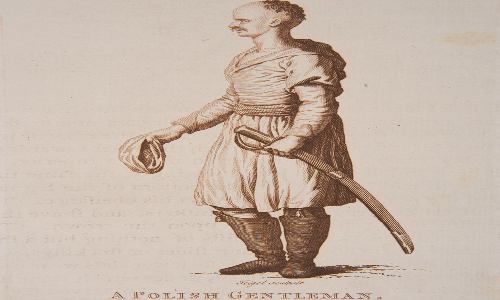Migration
Click on these headers to read about the three projects we supported under this strand. The first two, the strand's flagship research and teaching components, were led by Prof. Anne White, UCL SSEES.
- Invisible Poles: an open-access book of interviews with Poles in the UK
This project was delivered by Dr Kinga Goodwin, Research Officer, and Anne White, Principal Investigator and Professor of Polish Studies and Social and Political Science, UCL School of Slavonic and East European Studies.
Invisible Poles looked at how British-born people of Polish descent have experienced the recent increase in the Polish population of the UK, as well as easier access to Poland since Poland joined the EU in 2004. The twenty-eight interviewees came forward because they had stories to tell about becoming more ‘visibly’ Polish – visible to Polish-born Poles in the UK and Poland, but also to their families and friends. Their stories are gathered together in Invisible Poles: a Book of Interview Extracts, an open access book which can be downloaded below.
Invisible Poles is a tribute to anthropologist Keith Sword and his research, which began at SSEES in the 1980s and 1990s, but was cut short by Sword’s untimely death. His Polish Migration Project, financed by the M. B. Grabowski Fund and Federation of Poles in Great Britain, consisted of interviews with first- and second- generation Polish migrants in the UK, as well as extensive analysis of written sources. In 1989, Sword published The Formation of the Polish Community in Great Britain, 1939-50 (with Norman Davies and Jan Ciechanowski) and, in 1996, Identity in Flux: the Polish Community in Great Britain. A companion volume, Deportation and Exile: Poles in the Soviet Union, 1939-48 (1994, 1996) traces the fates of people who often, like the parents and grandparents of many of our interviewees, ended up fighting with the Allied forces. (All three books can be purchased from the UCL on-line shop.) In Identity in Flux, Sword describes the activism of Poles who came to the UK after the Second World War, but also, from the 1970s, the decline of Polish community organisations. In his final sentence, Sword (1996: 233) wrote that ‘While it seems rash to make predictions, it seems likely – unless unforeseen changes take place – that only London and a handful of provincial metropolitan centres will retain organised Polish communities of any viability in twenty years’ time’. That unforeseen change occurred after 2004. The Invisible Poles project picks up the story where Sword left off.
Full transcripts of the Invisible Poles interviews are housed in SSEES Library, alongside the Sword archive. Click on the image below.
- Teaching module: Migration in the EU
Anne White, Professor of Polish Studies and Social & Political Science at UCL, designed and taught a new MA module, “Migration in the European Union”. The module examines the nature, causes and impact of migration within and into the European Union since 2004. Taking EU migration as a case study, it considers the validity of claims about the novelty of recent global migration trends, focusing particularly on transnationalism, its relationship to integration and return, and the concept of mobility. The module also uses EU migration as a case study in ‘migration without borders’ to consider the social, economic and political impact of uncontrolled immigration on receiving countries, the integration experiences of migrants, and the implications for citizenship. This is a one-term, 20-hour module, assessed through a 1000-word seminar paper (25%) due in November, and a 3000-word essay (75%). Students on the course have to conduct original fieldwork. Several students on the programme chose to write their MA dissertation on a topic relevant to this module, supervised by Prof White.
As part of the Centre of Excellence programme, we offered bursaries to support the fieldwork of four students, selected through a competitive process in all three years, to complete their MA dissertations:
2016-17: Vassiliki Milonidis
2017-18: Aleksandra Dmitriew
2018-19: Maria Paiva Rosado Rente, “Boys to Men: Conceptualising “safe spaces” for unaccompanied asylum-seeking youth coming of age in Athens”
2018-19: Hetty van Werven, “The impact of immigration and asylum policy changes by Italy’s Conte government on asylum seekers and the local community – Local Sicilian perspectives from asylum seekers, NGOs and politicians”
- Online resource guides
We commissioned three new online guides linking to primary sources from governments, international organisations, NGOs, research institutions and the media. They were created by specialist staff of the UCL SSES Library, and are hosted on the library website.
- The first guide focused on LGBTQ issues in Eastern Europe, including queer histories, queer culture, geographies of sexualities, gender identity, homophobia, LGBTQ citizenship, migration and asylum.
- The second focused on recent migration from Central and Eastern Europe to the UK.
- A third guide, to TV news in Eastern Europe, collates TV news channels and information programmes from the region, enabling access both to current news and extensive online archives.
 Close
Close




